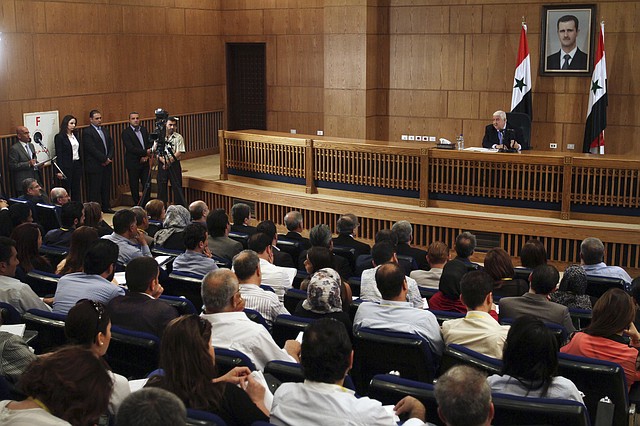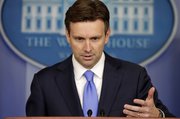U.S. rallying allies to back Syria strikes
Wider targeting of Islamists in Obama plan, officials say
Syrian Foreign Minister Walid al-Moallem speaks during a press conference, giving the first public comments by a senior Assad official on the threat posed by the Islamic State group, in Damascus, Syria on Monday, August 25, 2014. Al-Moallem warned the U.S. not to conduct airstrikes inside Syria against the Islamic State group without Damascus consent, saying any such attack would be considered an aggression. Al-Moallem also said that Syria is ready to work with regional states and the international community amid the onslaught of Islamic militants there and in Iraq, adding that the Syrian government is a crucial partner in the war on terror.
Wednesday, August 27, 2014
WASHINGTON -- The United States has begun to mobilize a broad coalition of allies behind potential military action in Syria and is moving toward expanded airstrikes in northern Iraq, administration officials said Tuesday.
RELATED ARTICLE
http://www.arkansas…">U.S.: Libya in 'very fragile place'
President Barack Obama, the officials said, is broadening his campaign against the Sunni militants of the Islamic State extremist group and nearing a decision to authorize airstrikes and airdrops of food and water around the northern Iraqi town of Amerli, home to members of Iraq's Turkmen minority. The town of 12,000 has been under siege for more than two months by the militants.
"Rooting out a cancer like ISIL won't be easy and it won't be quick," Obama said in a speech Tuesday to the American Legion in Charlotte, N.C., using an abbreviation for the Islamic State. He said the United States was building a coalition to "take the fight to these barbaric terrorists," and that the militants would be "no match" for a united international community.
Administration officials characterized the dangers facing the Turkmens, who are Shiite Muslims considered infidels by the Islamic State, as similar to the threat faced by thousands of Yazidis, who were driven to Mount Sinjar in Iraq after attacks by the militants.
The U.S. began launching strikes against the Islamic State inside Iraq earlier this month, with Obama citing the threat to American personnel in the country and the humanitarian crisis faced by the Yazidis as his rationale.
As Obama considered new strikes, the White House began a diplomatic campaign to enlist allies and neighbors in the region to increase their support for Syria's moderate opposition and, in some cases, to provide support for possible U.S. military operations.
The countries likely to be enlisted include Australia, Britain, Jordan, Qatar, Saudi Arabia, Turkey and the United Arab Emirates, officials said.
The officials, who asked not be named discussing sensitive internal deliberations, said they expected that Britain and Australia would be willing to join the U.S. in an air campaign. The officials said they also want help from Turkey, which has military bases that could be used to support an effort in Syria.
Turkey is a transit route for foreign fighters, including those from the U.S. and Europe who have traveled to Syria to join the Islamic State. Administration officials said they are now asking officials in Ankara to help tighten the border.
The administration also is seeking intelligence and surveillance help from Jordan, the officials said, as well as financial help from Saudi Arabia, which bankrolls groups in Syria that are fighting President Bashar Assad.
Army Gen. Martin Dempsey, chairman of the Joint Chiefs of Staff, said Tuesday that the U.S. has been meeting with allies in the region to help develop a better understanding of the Islamic State group's threat. He said he believes that those talks are now beginning to "set the conditions for some kind of coalition to form."
He said they are "trying to better understand the threat that ISIS poses, not just in Iraq and Syria but regionally."
surveillance flights
On Monday, the U.S. began surveillance flights over Syria after Obama gave the OK, U.S. officials said, a move that could pave the way for airstrikes against Islamic State militant targets there.
While the White House said Obama has not approved military action inside Syria, additional intelligence on the militants likely would be necessary before he could take that step. Pentagon officials have been drafting potential options for the president, including airstrikes.
Two U.S. officials said Monday that Obama had approved the flights, while another U.S. official said early Tuesday that they had begun. The officials were not authorized to discuss the matter by name, and spoke only on condition of anonymity.
Dempsey on Tuesday declined to comment on the surveillance flights.
"Clearly the picture we have of ISIS on the Iraqi side is a more refined picture," said Dempsey, using another acronym for the Islamic State. "The existence and activities of ISIS on the Syrian side, we have ... some insights into that but we certainly want to have more insights into that as we craft a way forward."
Other Pentagon officials have said the only way the threat from the militants can be fully eliminated is to go after the group inside Syria.
Obama has long resisted taking military action in Syria, a step that would plunge the U.S. into a country ravaged by civil war. However, the president's calculus appears to have shifted since the Islamic State announced last week that it had killed American journalist James Foley, who was held hostage in Syria. The group also is threatening to kill other U.S. citizens being held by the extremists in Syria.
"Our message to anyone who harms our people is simple: America does not forget our reach is long," Obama said Tuesday. "We are patient. Justice will be done. We have proved time and time again we will do what's necessary to capture those who harm Americans."
Sen. Bob Corker of Tennessee, ranking Republican on the Foreign Relations Committee, said the administration "has not yet shared with us what their plans are." He said he hoped the White House would go to the Congress with a request for authorization to act.
"I think it's our responsibility as elected officials to let the American people know where we stand with respect to national security matters," Corker told MSNBC. "For the American people's sake, Congress should weigh in. Congress should be a part of it."
The White House would not comment on Obama's decision to authorize surveillance flights over Syria.
"We're not going to comment on intelligence or operational issues, but as we've been saying, we'll use all the tools at our disposal," said Caitlin Hayden, spokesman for the White House National Security Council.
The U.S. stepped up its air surveillance of the Islamic State inside Iraq earlier this year as Obama began considering the prospect of airstrikes there. The administration also has run some surveillance missions over Syria, including ahead of an attempted mission to rescue Foley and other U.S. hostages earlier this summer.
The U.S. special forces who were sent into Syria to carry out that rescue mission did not find the hostages at the location where the military thought they were being held. Officials who confirmed the failed rescue last week said the U.S. was continuing to seek out intelligence on the other hostages' whereabouts.
Administration officials have said a concern for Obama in seeking to take out the Islamic State inside Syria is the prospect that such a move could unintentionally help Assad in the fight against rebels who want to oust him. The Islamic State is among the groups seeking Assad's ouster, along with rebel forces aided by the U.S.
State Department spokesman Jen Psaki said Tuesday that if Obama were to order airstrikes in Syria, there would be no cooperation with Assad.
"We're not going to ask for permission from the Syrian regime," she said.
A top Syrian official said Monday that any U.S. airstrikes without consent from Syria would be considered an aggression.
American woman held
As the U.S. contemplated its next move in Syria, a representative for an American family said Tuesday that a 26-year-old American woman who was doing aid work in the country was among those being held by the Islamic State.
The woman was captured last year while working with three humanitarian groups in Syria. A representative for the family and U.S. officials asked that the woman not be identified out of fear for her safety. All spoke on condition of anonymity because they were not authorized to discuss the issue publicly.
More than a week ago, Foley, a freelance journalist from Rochester, N.H., was beheaded by the Islamic State group, which kidnapped him in November 2012.
An Islamic State video of Foley's beheading also showed another missing American journalist, Steven Sotloff, and warned he would be killed next if U.S. airstrikes continued. U.S. officials believe the video was made days before its release and have grown increasingly worried about Sotloff's fate.
Other American hostages have been held by other militant groups, including Peter Curtis from Boston, who was recently released by al-Nusra Front, a rival Sunni extremist group. Another U.S. freelance journalist, Austin Tice of Houston, disappeared in Syria in August 2012 and is believed to be held by the same organization.
There were reports Tuesday that another American, Douglas McArthur McCain of San Diego, was killed in Syria, but the circumstances of his death were unclear.
A U.S. official, who spoke on condition of anonymity because he was not authorized to speak about the investigation, said McCain was in the country to fight alongside a terrorist group, most likely the Islamic State.
A relative, Kenneth McCain, said the State Department had called his family to inform them that Douglas McCain had been killed in Syria.
"We do not know if he was fighting anyone," Kenneth McCain said.
It was unclear when Douglas McCain, who grew up outside Minneapolis and had most recently lived in San Diego, traveled to Syria.
A cousin, Kenyata McCain, told the Minneapolis Star Tribune that she had spoken to McCain as recently as Friday and "he was telling all of us he was in Turkey."
"I know that he had strong Muslim beliefs," she told the newspaper. "But I didn't know that he was in support of ISIS. I didn't think he would be."
Information for this article was contributed by Helene Cooper and Mark Landler of The New York Times; by Lolita C. Baldor, Julie Pace, Lara Jakes, Deb Riechmann, Eric Tucker, Amy Forliti, Julie Watson, Rhonda Shafner and staff members of The Associated Press; and by Anne Gearan of The Washington Post.
A Section on 08/27/2014



